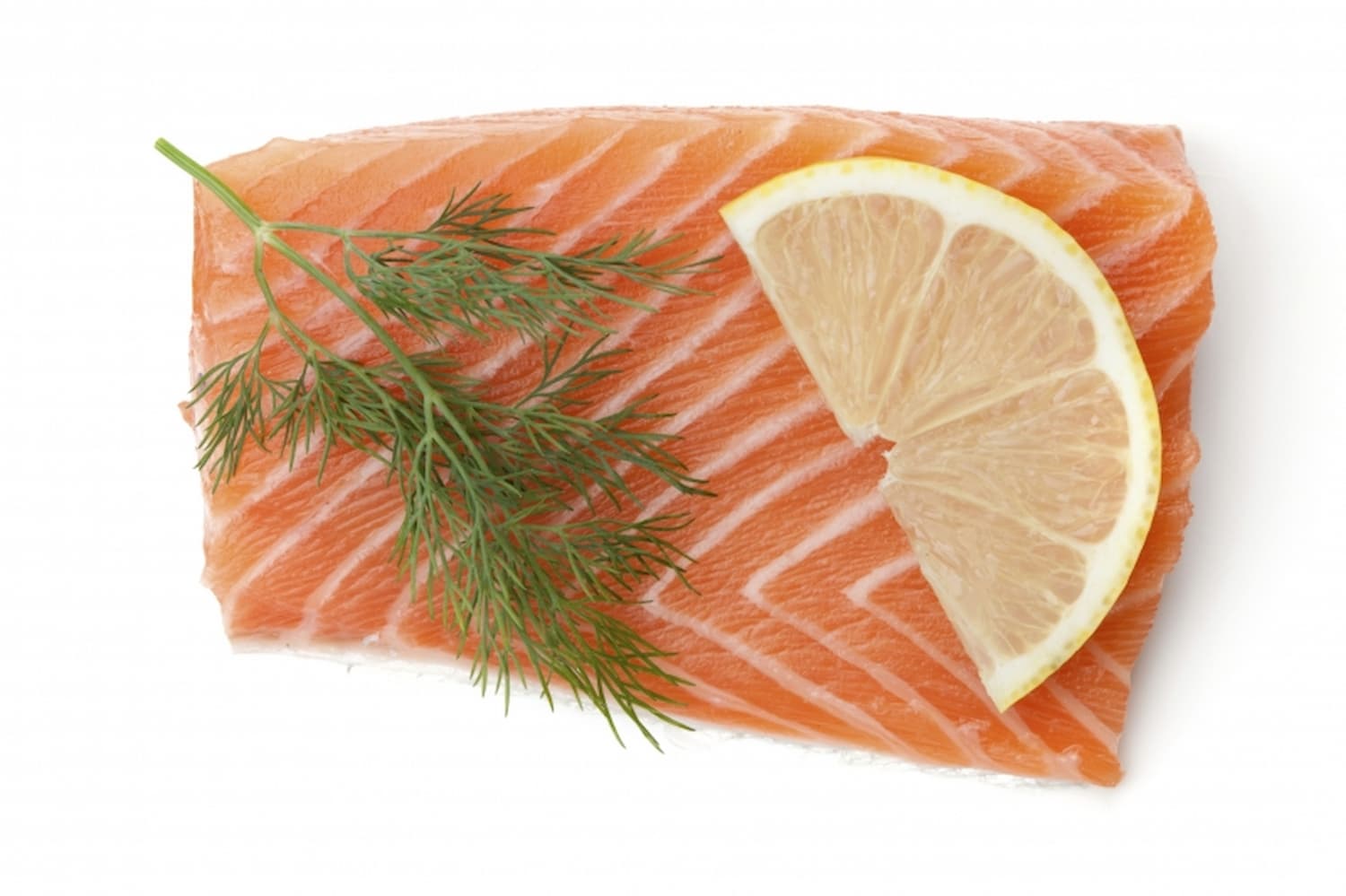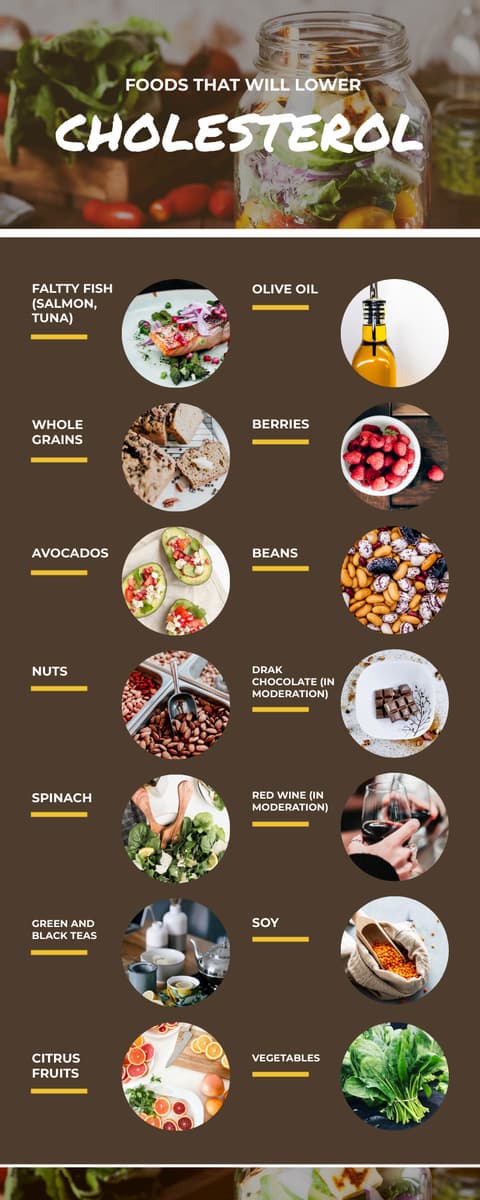Cholesterol is a natural fatty substance found in the body that is essential to health. It assists in the synthesis of cell membranes and supports nerve signals. Certain types of cholesterol, particularly low density lipoproteins or LDL cholesterol, can be harmful to one's health if they accumulate in excess in the blood. This type of cholesterol forms fatty deposits in the arteries that block the blood stream, which leads to poor circulation.
Certain foods contain cholesterol. This is coined 'dietary cholesterol' and is found in all animal products. Recent research shows that your blood cholesterol levels will be minimally affected by eating foods that are high in cholesterol. The problem lies where there is a high consumption of saturated fats and trans-fats.
If your blood cholesterol levels are high, food can help you lower them significantly.
Naturally lowering your cholesterol
A low cholesterol diet is one of the best means of lowering cholesterol levels and the potential risk of heart disease. It is important, however, to discuss medication and diet with your health care professional. The secret to lowering blood cholesterol levels is by simply making a few tweaks and following these tips:
- Increase your intake of healthy fats like omega-3 fatty acids
- Increase fibre intake
- Increase fruit intake (2 per day) and vegetables intake
- Decrease your consumption of saturated fats and trans fats
Some food ideas for slashing blood cholesterol levels:
Oatmeal
Begin your day with oatmeal. Oatmeal contains soluble fibre which is known to decrease levels of LDL's. You can top your oats with berries and nuts which increases the fibre, antioxidant and protein levels.
Fish
Increase your consumption of fatty fish such as salmon, tuna, sardines and mackerel, aiming for 20 grams per day. Oily fish is heart healthy thanks to its high levels of omega 3 fats. Including fish oil supplements in your balanced diet is also highly recommended.
Fibre
Forty grams of fibre per day is an effective means in which to lower blood cholesterol levels, as fibre lowers the levels of triglycerides that get converted into bad cholesterol, which thickens the artery walls and increases the risk of heart attack or stroke. Beans and legumes are very high in soluble fibre and can be enjoyed in soup and casseroles. Baked beans also contain a high level of fibre. It is important, however, to choose baked beans lowest in sugar content. Blackberries, strawberries and blueberries have also been shown to lower LDL levels.
Nuts and seeds
Rich in polyunsaturated fats, nuts and seeds are heart healthy as well as keep blood vessels healthy. They contain high levels of niacin, an essential plant compound that raises high-density lipoprotein (HDL), otherwise known as good cholesterol, while lowering LDL cholesterol levels at the same time. Eating a handful of assorted, raw nuts per day is a good start.
Leafy greens
Green, leafy vegetables make up a heart-healthy diet as they prevent excess cholesterol from penetrating into the bloodstream. Eating more leafy greens, such as spinach and kale, not only reduces LDL cholesterol levels in the body, but it also provides lots of fibre, minerals and other nutrients which can contribute to your overall health when eaten daily.
Fresh fruit juice
As for fruit juices, what you want to avoid are those that contain high fructose corn syrup (HFCS) like apple juice and grapefruit juice since they raise triglyceride levels and LDL cholesterol in the body thus increasing bad cholesterol. Go for pomegranate, tomato and green tea extracts as they contain antioxidants that help lower levels of LDL cholesterol.
There are different ways to go about what diet you should follow in order to reduce your levels of LDL cholesterol. However, what works for one person may not work for another because what causes high LDL varies from person to person. In many cases, what doctors often recommend is limiting fats, eating lots of fruits and vegetables rich in antioxidants, exercising regularly, and opting for what's also referred to as a Mediterranean diet, which mainly emphasises on fish, nuts, olive oil and whole grains.
Source: Visual Paradigm Online
Shifting to a healthy, low-cholesterol diet
Switching to a new diet is ideal, but you cannot do it overnight. However, you can make gradual changes to what you eat daily to reduce your levels of cholesterol. When shopping for cuts of meat, opt for lean meats that contain lower saturated fat and sodium. Replace full-fat dairy products with plant proteins like almond or rice milk, as well as low-fat yoghurt and cheese.
You also want to stay away from processed foods as they are packed with trans fats, especially chips, cookies and other baked goods like cakes, pies and doughnuts. Trans and saturated fats are also abundant in canned goods, frozen dinners and fast food.
When it comes to sauces and salad dressings, select those offering fewer grams of fat per serving. If you absolutely love creamy salad dressings, consider using only half the amount you're accustomed to. For example, if a standard serving size is two tablespoons, try using just one tablespoon of full-fat dressing. Many lower-fat sauces and spreads contain a fair amount of sodium so check the label before buying.
If you have a sweet tooth and can't live without chocolate, having dark chocolate in moderation can help reduce your risk of heart disease. Combining almonds and dark chocolate lowered LDL levels in patients with cardiovascular risk factors, according to academic research institutions.
By swapping out some of the saturated fats in your diet for foods that are rich in healthier monounsaturated and polyunsaturated fats, you will help keep your heart healthy. Cholesterol, despite being an important component of the human body's normal processes, should be monitored on a regular basis. If you're not sure where to start with your new diet, consult with a healthcare provider who specialises in low-cholesterol diets.
Originally published on Nov 21, 2014









